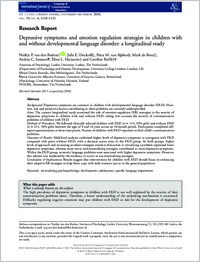Depressive symptoms and emotion regulation strategies in children with and without developmental language disorder : a longitudinal study
- den Bedem, Neeltje P. Institute of Psychology Leiden University Leiden The Netherlands
- Dockrell, Julie E. Department of Psychology and Human Development University College London London UK
- Alphen, Petra M. Royal Dutch Kentalis Sint‐Michielsgestel The Netherlands
- Rooij, Mark Institute of Psychology Leiden University Leiden The Netherlands
- Samson, Andrea C. Swiss Center for Affective Sciences, University of Geneva Geneva Switzerland
- Harjunen, Elina L. Psychology, University of Helsinki Helsinki Finland
- Rieffe, Carolien Institute of Psychology Leiden University Leiden The Netherlands
-
2018
Published in:
- International Journal of Language & Communication Disorders. - 2018, vol. 53, no. 6, p. 1110-1123
English
Background: Depressive symptoms are common in children with developmental language disorder (DLD). However, risk and protective factors contributing to these problems are currently underspecified. Aims: The current longitudinal study examined the role of emotion-regulation (ER) strategies in the severity of depressive symptoms in children with and without DLD, taking into account the severity of communication problems of children with DLD. Methods & Procedures:We followed clinically referred children with DLD (n = 114, 49% girls) and without DLD (n = 214, 58% girls) between the ages of 8 and 16 years across an 18-month period. Participants completed selfreport questionnaires at three time points. Parents of children with DLD reported on their child’s communication problems. Outcomes & Results: Multilevel analyses confirmed higher levels of depressive symptoms in youngsters with DLD compared with peers without DLD, with a decrease across time in the DLD group. In both groups, higher levels of approach and increasing avoidant strategies aimed at distraction or trivializing a problem explained lower depressive symptoms, whereas more worry and externalizing strategies contributed to more depressive symptoms. Within the DLD group, semantic language problems were associated with higher depressive symptoms. However, this relation was mediated by the tendency to worry or use externalizing strategies. Conclusions & Implications: Results suggest that interventions for children with DLD should focus on enhancing their adaptive ER strategies to help them cope with daily stressors just as in the general population.
- Faculty
- Faculté des lettres et des sciences humaines
- Department
- Département de Pédagogie spécialisée
- Language
-
- English
- Classification
- Special education
- License
-
License undefined
- Identifiers
-
- RERO DOC 333150
- DOI 10.1111/1460-6984.12423
- Persistent URL
- https://folia.unifr.ch/unifr/documents/309507
Statistics
Document views: 185
File downloads:
- Fichier principal: 215
